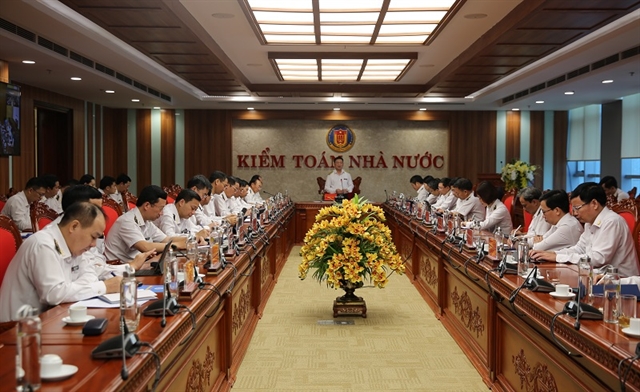 Economy
Economy


|
| Representatives attend a conference concluding work of October and setting up a plan for November 2020 of the State Audit of Việt Nam. — Photo courtesy of the State Audit of Việt Nam |
HÀ NỘI — In 2020, the State Audit of Việt Nam (SAV) will focus on reducing the quantity of audited units to focus on quality.
The plan was issued in Decision No 1866 /QĐ-KTNN on November 28, 2020. Following successes in performing audit tasks in 2019, the plan is to strengthen co-ordination to reduce overlaps and duplication in inspection and auditing activities, as well as focus on improving quality.
Following major orientations of the Party and State, issues of public concern, issues with high risks in management and use of finance, public assets, and audit plans, in 2020, the SAV actively built audit plans early based on proposals of different units in the sector.
The plans were built following co-ordination and consultation with concerned agencies. It ensures compliance with the laws, strictness, transparency and publicity, and is close to reality.
In particular, to avoid overlaps in inspection and auditing activities, the SAV actively worked with the Government Inspectorate to discuss the proposed inspection plan for 2020. The two sides have jointly reviewed, checked and agreed on each audit and inspection activity to avoid overlapping and duplication of content and time. This is one of the contents that leaders of the SAV and the Government Inspectorate have paid great attention to and effectively co-ordinated and implemented in recent times.
General State Auditor General Hồ Đức Phớc said the audit teams must strictly comply with the approved audit plan, in accordance with projects which were publicised since the beginning of the year to avoid trouble for the audited units.
Therefore, the SAV leaders have instructed the audit units to continue to focus on innovating and improving the quality of each audit through effective application of information technology.
The audit plans should focus on analysing, fully and comprehensively evaluating the collected information and documents, shortening audit time, focusing on the general audit to deeply and comprehensively assess the management of each level and each unit.
Immediately after the issue of the Audit Plan 2020, the SAV has been widely publicised on the SAV’s portal, the auditing newspaper and other mass media, so that audited units and concerned people are well informed, and since then actively co-ordinated in the audit work.
Reduced quantity to focus on quality
The highlight in the Audit Plan 2020 is that SAV continues to drastically reduce the number of audited units compared to 2019 to focus on improving the quality and efficiency of audits, as well as allocating enough time to fully complete other tasks during the year. Accordingly, the plan for 2020 is signed by the State Auditor General with 158 audited units, a decrease of about 20 per cent compared to that in early 2019 (the plan in 2019 also cuts 20 per cent of audited units compared to 2018).
At the same time, the SAV continued to conduct environmental audits and information technology audits.
To successfully complete the Audit Plan 2020, the SAV will implement many solutions. It will closely coordinate with ministries, central agencies, committees and local authorities in auditing activities, especially improving the quality and efficiency of audits, proposing improvements to legal policies and the law, monitoring and urging the implementation of audit conclusions and recommendations. It will also promptly transfer records to investigation and inspection agencies with signs of legal violations detected through audits, in order to enhance the role of the SAV in the fight against corruption and combating wastefulness.
In particular, in 2020, the SAV will continue to promote administrative reform and reform methods of the organising of the audit. — VNS